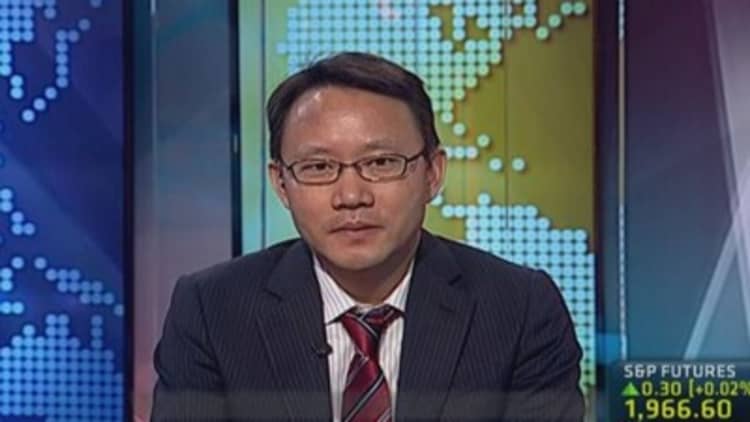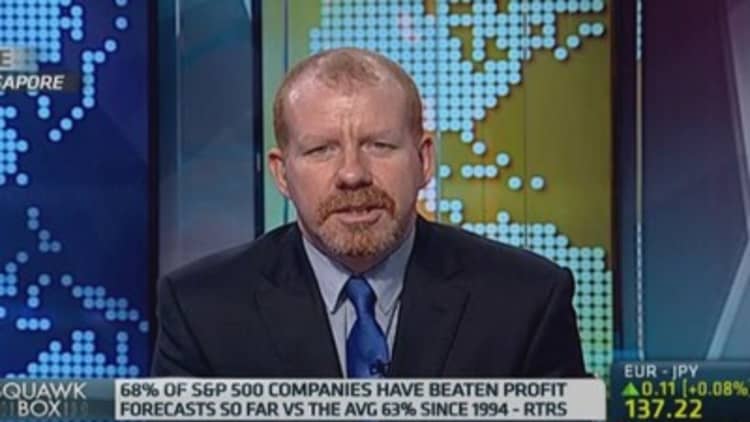
China shares may be seeing a flood of bullish calls after years of under-performance, but some analysts remain solidly pessimistic on the market.
"People have been ignoring a lot of risks out of China," David Cui, head of China equity strategy at Bank of America-Merrill Lynch, told CNBC Tuesday. "Look at what's happening in the property market, look at how fast bad debts have been showing up throughout the financial system."
He expects the HSCEI index of H-shares, already down around 2.5 percent so far this year, to fall further to 9600 by year-end from around 10,532 currently.
Read MoreIs it time to go outright bullish on China?
China's debt levels have been a major concern for investors for years, spurring fears that increasing borrowing is fueling a dangerous property bubble and overcapacity in many industries.
House prices on the mainland increased at double-digit rates throughout most of 2013, but began cooling toward year-end as government tightening measures started to take effect. That fed concerns a too-sharp slowdown could hurt overall economic growth as the property sector reportedly accounts for as much as 20 percent of gross domestic product (GDP).
Last week, little known Huatong Road & Bridge Group Co. warned it wouldn't be able to pay down its debt, likely marking the first time a Chinese company has openly defaulted on both principal and interest for a bond.
Read MoreChina property stocks jump on hopes curbs will be relaxed
"There will an avalanche of defaults coming up in the system. This is only the beginning," Cui said. "The key issue for us is the excessive capacity in the system and overleverage. So when you combine these two factors, it makes the defaults almost inevitable."
While some analysts point to changes in Beijing's game plan, including using targeted, rather than broad-based, stimulus to keep the economy humming without encouraging overcapacity, Cui sees signs local governments are still resorting to "the usual white elephant projects" to hit the government's 7.5 percent GDP growth target for the year.
"Things have got so bad, it will probably take a financial crisis to clean the bad stuff out of the system," Cui said, adding he believes the government needs to write off the bad debt, let banks raise equity to stabilize the financial system and reduce the overcapacity throughout the system.
Read MoreAmid Ukraine and Gaza, China default raises fears
But Cui may be swimming against the tide, with many analysts starting to turn positive, if not outright bullish. Global emerging market fund managers turned around 20 percent overweight on China in July, up from a net of around 20 percent underweight in June, according to the Bank of America-Merrill Lynch fund manager survey.
Last month, Societe Generale said it views the market as cheap, while Citigroup calls China a "key overweight" in its emerging market strategy.
"People are looking at things glass half full," Cui said. "But as the risks keep accumulating, at a certain point, people will have a change of mentality."
Read MoreInvesting in China: A Catch-22?
To be sure, stocks have certainly reflected quite a few concerns. The Shanghai Composite is down more than 38 percent over the past five years, even as other global markets have rallied solidly off lows touched during the global financial crisis.
Some analysts are more optimistic on the market outlook. Whether investors should buy into China's story likely should depend on their time horizon, Steve Brice, chief investment strategist at Standard Chartered Wealth Management, told CNBC.

"If you are looking at a five-year time horizon, then probably China makes a lot of sense," he said.
"Valuations are very cheap," he noted. "You've got the concerns around non-performing loans in the banking sector, but you're being paid handsomely to own Chinese banks at the moment with dividend yields of 6-7 percent."
But with the recent easing measures probably only temporary to stabilize growth, credit is likely to tighten up again over the next six to 12 months, suggesting stocks will underperform over that period, Brice said.
—By CNBC.Com's Leslie Shaffer; Follow her on Twitter @LeslieShaffer1

